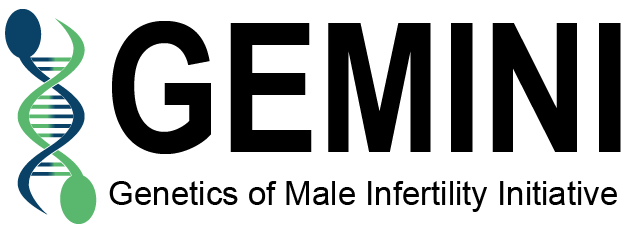The first grant entitled Genomics of spermatogenic impairment was awarded in 2014 and it has now been renewed for another 5 years. The lead principal investigators on this grant are Don Conrad of OHSU and Ki Aston of University of Utah. Congratulations!
PROJECT SUMMARY: This is a renewal application to the NICHD-funded Genetics of Male Infertility Initiative (GEMINI) established under R01HD078641. In the past funding period, we added key knowledge to our understanding of Mendelian forms of nonobstructive azoospermia (NOA). Through GEMINI, we have successfully navigated the intricacies of establishing and engaging valuable clinical collaborators, exceeding recruitment goals. In addition, we have developed and refined powerful software to map genetic causes for n=1 cases of NOA, and in so doing have successfully identified a large number of novel loss-of-function variants responsible for the disease. Characterization of the underlying genetic basis for severe spermatogenic impairment is critical for its implications in improving diagnosis and treatment in reproductive medicine. Improved understanding of genetic causes of male infertility may have broader implications for the health of affected men. Abundant epidemiological data indicate that male infertility is a risk factor of developing other comorbidities including various types of cancer, cardiovascular disease, diabetes and overall reduced general health. While we expect that GEMINI will continue to uncover new infertility mutations with diverse methods of action, we will unify our research in this cycle around the central theme of “comorbidity”. We hypothesize that the epidemiological association between male infertility and diseases such as cancer may be caused by variants underlying spermatogenic impairment and the increased burden of mutations in infertile men. The central goal of the project is to continue to identify new Mendelian forms of severe spermatogenic impairment and additional alleles in known and suspected male infertility genes. This genetic discovery will be driven by exome sequencing of a new cohort of 1000 men with severe spermatogenic impairment and 1000 men with normal semen parameters. Drawing upon lessons from the first phase of GEMINI, we are proposing a number of additions to our approach, including new statistical methods and functional assays of primary tissue from cases, and new collaborations for replication and model organism studies. We will apply the analytical tools developed under R01HD078641 to identify potential infertility variants from publicly available genomes, including over 500,000 that will be available through the UK Biobank (UKBB), the eMERGE Network, and the Utah Genome Project (UGP). The rich phenotypic resources from these biobanks will be used to perform both phenome-wide association studies (PheWAS) and more targeted analyses to identify genetic links between infertility and both known and novel comorbidities. Successful completion of these aims will significantly improve our understanding of the genetic basis for spermatogenic impairment and the basis for the observed relationship between male infertility and other comorbidities, with the overarching goals of improving male infertility diagnosis and treatment as well as improving our capacity to risk-stratify infertile men based on their likelihood of developing specific comorbidities later in life.
